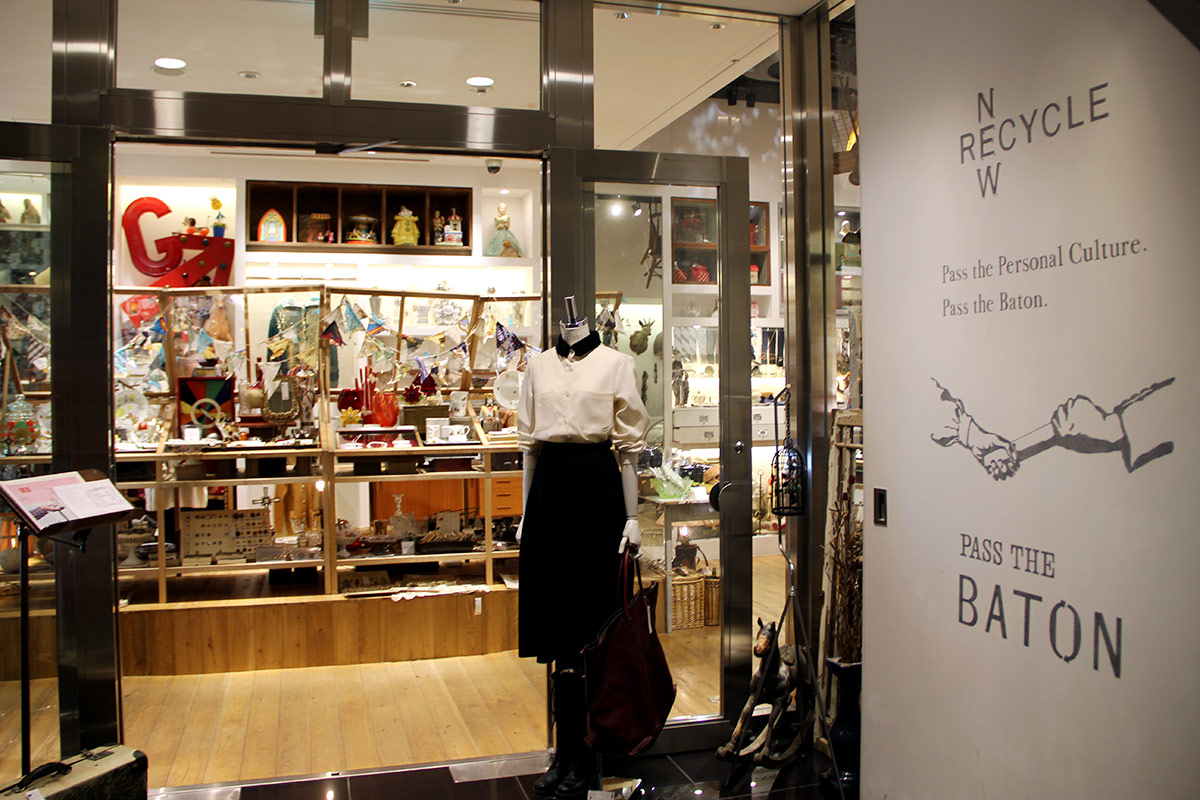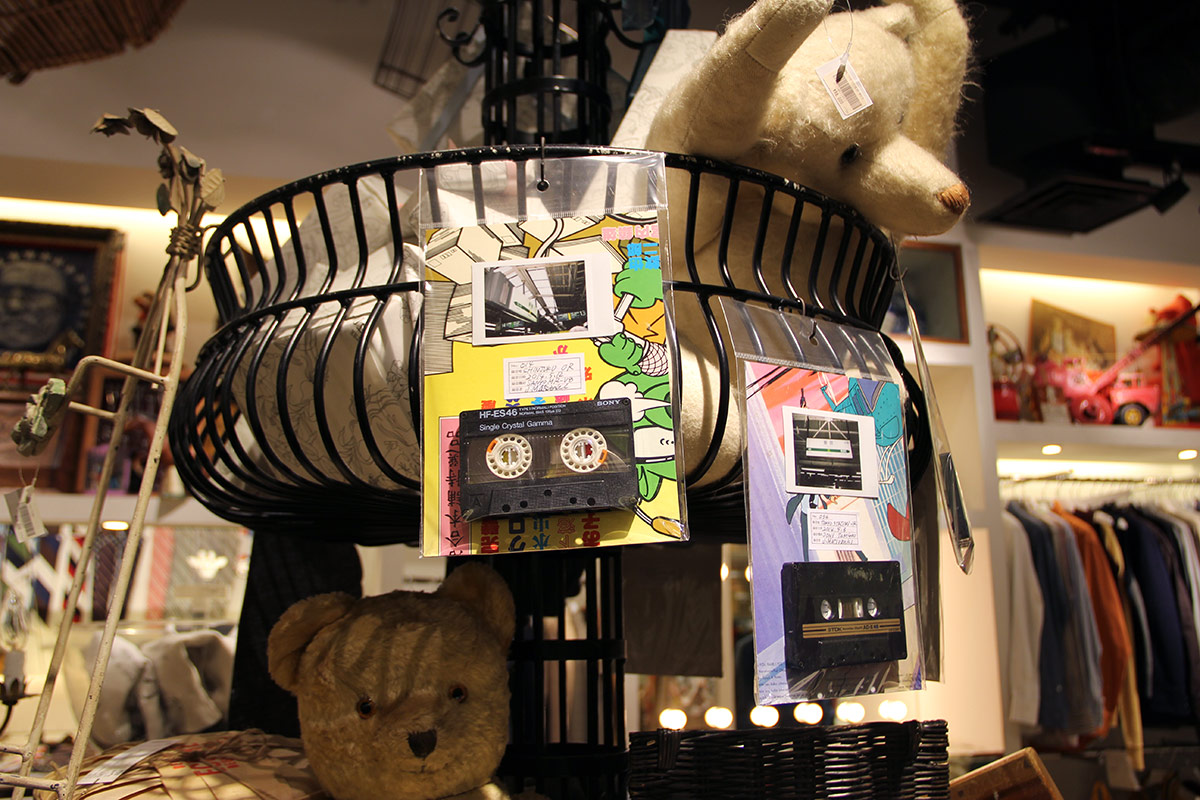Tokyo’s Pass The Baton Adds a Personal Touch to Vintage
Our visit to the concept consignment shop’s location in Omotesando, where items bear the owner’s photograph and an anecdote


Located at the edge of the Tadao Ando-designed Omotesando Hills shopping complex, a few floors underground into basement territory, is the “new recycle” shop Pass the Baton. The space (one of two locations in Tokyo) hosts an orderly explosion of used and repurposed items, making customers feel as if they’ve walked into a wonderland where a sense of time and location dissipates. A lamp that resembles a salon hair drying machine, gilded birdcages, teddy bears, a ceramic pig’s head sculpture, bags in the shape of rustic bread (which, an employee explained, were baked in actual ovens to mimic a baked texture) are scattered between more traditional offerings like vintage Chanel purses, a good mix of designer apparel and shoes, and jewelry. Even the ceiling isn’t off limits for displaying the trove of treasures: antique wooden chairs, a ship wheel, a non-spherical disco ball, even a trout replica, all dangle from above—though the “chandelier” made entirely from rows and rows of coffee cups isn’t up for sale.

Founded by Masamichi Toyama, the store (designed by acclaimed Tokyo studio Wonderwall) inspires visitors to find joy and wonder in well-loved items. Its mission is stated in its name: connecting two lives by “passing the baton” from one person to another. The store achieves this by including a photograph of the previous owner and a personal anecdote from them about each item. News announcer Keiko Yashio writes about the Diane von Furstenberg wrap dress she is selling: “The print was too flashy for me, but I bought it as an adventure when shopping with my friend.” Author, singer and poet Kou Machida writes about his Pelikan fountain pen: “I received this 13 or 14 years ago, and used it to write thank you letters and such.” Even just one sentence can place an everyday object in a new light, adding almost a sense of duty upon the next owner to treat it with care.
In contrast with other consignment stores that sell exclusively high-end goods and thrift stores that promise rock-bottom prices, Pass the Baton sought a different approach by letting stories and personalities, not condition or price of goods, be the filter. It’s up to the person selling their wares to decide the price, which will be split 50/50 with the shop. Items are only on sale for three months so turnover is quick. Pass the Baton has also teamed up with non-profit organization Charity Platform to offer the option of donating sales to a variety of charities. Finally, buyers have the chance to write a note to previous owners as well—solidifying the connection. And hearing their reaction upon discovering an item and their reason for purchasing it is certainly a stark contrast to those five-star eBay reviews for “fast shipping.”

The consigners here include a fair share of notable names. For instance, a quick glance at the online shop shows quite a few wares from Japanese singer Maki Nomiya, such as this Warhol-inspired Campbell Soup dress she wore on tour performing as now-dissolved pop group Pizzicato Five. Nigo of Bape even has a store-within-a-store here (“Nigolden Store”), dropping off pieces regularly.
Pass the Baton also offers “remakes”—they find company dead stock that couldn’t be sold due to tiny imperfections and add a little of their own essence. Rhodia notebook covers that had irregular logo font size are now sold with original illustrations from Pass the Baton; when Japanese glass manufacturer Hario had to shut down their factory after the devastating March 2011 earthquake hit, uneven clumps of glass were formed. Pass the Baton repurposed the defective pieces into jewelry, naming it the “Cullet” series.

What we ended up taking home, however, were cassette tapes that were packaged with a piece of art and a Polaroid photo. Back in May, famed vintage consumer electronics collector and miracle repairman Junichi Matsuzaki (who’s particularly enamored with boomboxes) held a show at Pass The Baton called “Tokyo Sampling,” putting these tapes on view. Whatever content the cassette tapes originally held were erased and recorded over with soundscapes of contemporary Tokyo—like train stations around the capital such as the Shinjuku JR or Kita-Senju. An accompanying handwritten info card indicates when and where the recording took place, what radio cassette player it was recorded on; the Polaroid shows a glimpse of the location.

Matsuzaki leaves the other side of the cassette tape blank for its next owner to use as they wish, and this participatory artwork is symbolic of Pass the Baton’s overall manifesto: a meaningful exchange as valued objects—no matter how everyday they seem—change owners. A life is extended, a second chapter is written and an appreciation for items with a story is rekindled.
Visit Pass The Baton’s website to find info on upcoming events and how to get to their Marunouchi or Omotesando locations; those based outside of Tokyo can peruse their online shop.
Images by Nara Shin












